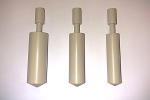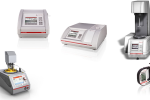Dynamic sub-micron assessment of hybrid biopolymer networks
For understanding and predicting shelf life and processing conditions of hybrid food systems a tight integration of experimental and physical modeling approaches is required. For providing relevant input for structure-based physical models the multi-scale structure will need to be described in a quantitative manner. For verification of these physical models quantitative descriptors of the evolving multi-scale structure under dynamic conditions are required. The current arsenal of spectroscopic and microscopic structural measurement techniques does not adequately cover the length and time scales required for quantitative description of sub-micron biopolymer networks under shelf-life and processing conditions. These techniques in particular lack capability to assess systems under stress and shear in a non-invasive and real-time manner. In this project
we develop methods to
Sub-micron biopolymer gel networks under stress: Non-invasive diffusometric nanoprobe measurements by NMR and MRI
will be used to assess sub-micron biopolymer networks when put under stress. NMR/MRI cells where stress can be applied to gels will be developed.

Sub-micron biopolymer sol networks under shear: RheoMRI techniques will be further developed to study biopolymer network formation/degradation at sub-µm scale. A main advantage of RheoMRI over available techniques is its non-invasive nature, ability to measure opaque systems, time-resolution and ability to link different length scales simultaneously. Detailed sub-pixel (nm-mm) resolution will be achieved by monitoring diffusional behavior of functionalized tracer nanoprobes (typically dendrimers). The challenge of diffusometric measurements under flow will be addressed by implementation of robust flow-compensated pulse sequences. Outcomes will be validated by small-angle
scattering measurements, also to be performed under (steady-state) shear conditions.



